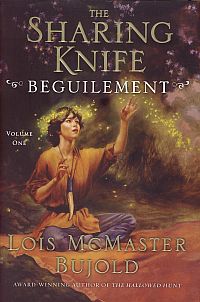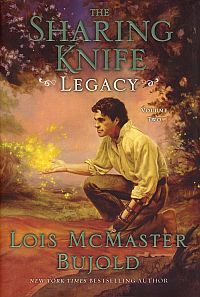
The Sharing Knife
Encyclopedia
 |
 |
| Split cover illustration of first two volumes, by Julie Bell Julie Bell Julie Bell is an American painter. A fantasy artist and wildlife artist, she is a former bodybuilder and fantasy model for her husband, painter Boris Vallejo.-Career:... , showing Fawn (l) and Dag (r). |
The Sharing Knife is a romance
Romance novel
The romance novel is a literary genre developed in Western culture, mainly in English-speaking countries. Novels in this genre place their primary focus on the relationship and romantic love between two people, and must have an "emotionally satisfying and optimistic ending." Through the late...
/fantasy
Fantasy
Fantasy is a genre of fiction that commonly uses magic and other supernatural phenomena as a primary element of plot, theme, or setting. Many works within the genre take place in imaginary worlds where magic is common...
crossover series by Lois McMaster Bujold
Lois McMaster Bujold
Lois McMaster Bujold is an American author of science fiction and fantasy works. Bujold is one of the most acclaimed writers in her field, having won the prestigious Hugo Award for best novel four times, matching Robert A. Heinlein's record. Her novella The Mountains of Mourning won both the Hugo...
, published in 2006–09. The original story grew so long in the telling that it was split into two volumes: Beguilement
Beguilement
The Sharing Knife: Beguilement is a fantasy novel by Lois McMaster Bujold, published in 2006. It is the first book in the The Sharing Knife series.-Plot:We are introduced to the main characters in this book...
(2006) and Legacy
Legacy (2007 novel)
The Sharing Knife: Legacy is a fantasy novel by Lois McMaster Bujold, published in 2007. It is the second book in the The Sharing Knife series.- Plot :...
(2007).
Bujold then wrote a sequel, which was also divided, into Passage
Passage (2008 novel)
Passage is a novel by Lois McMaster Bujold, published in 2008. It is the third in the tetralogy The Sharing Knife.- Plot :Passage is the immediate sequel to Legacy in The Sharing Knife series...
(2008) and Horizon
Horizon (2009 novel)
Horizon is a fantasy novel by Lois McMaster Bujold. It is the fourth in the tetralogy The Sharing Knife.-Plot:With Fawn's prompting, Dag seeks out a teacher. A powerful groundsetter at local New Moon Cutoff Camp could be the answer to his prayers, but conflicts arise between the insular Lakewalker...
(2009).
The original title of the sequel was The Wide Green World,
but Bujold and her publisher decided to make "Sharing Knife" the overall title, with the individual books given one-word subtitles and numbered 1–4.
Background
Beguilement establishes a fictional space inspired by the part of North America Bujold grew up in: the country south of the Great Lakes. (However, this fantasy universe is not and has never been our own.) Recovery from a grand collapse of a prior high magical culture has brought population and technology back to roughly the state of the early 19th-century American frontier—minus gunpowder. The grand collapse is accounted for in terms of hubris, though not in technology but in spirit, for lack of a clearer term, with a caste of near-magical aristocrats all but wiped out in a series of wars with their spirit-eating creation and its hatchlings, termed malices or blight bogles.A malice feeds on 'life force' or, in the novel's terms, ground -- which includes not only the internal order of living beings, but also the structural integrity of all matter, the emergent properties of form and function. It is able to mold man-like agents out of wild animals, called "mud-men", and to absorb the knowledge and skills of humans that it kills. The role of the clans of Lakewalkers, descendants of the said near-magical aristocracy, is to patrol the lands around the Dead Lake (remnant of the several Great Lakes) and to kill newly-hatched malices as early in their careers as may be. This they do with knives made from the thigh bones of their own dead, "primed" in the suicide of a mortally wounded or aged Lakewalker so that their death may be "shared" with the otherwise immortal malice. Hence the series title.
The Lakewalker caste's lifeway approximates Native Americans' hunter-gatherer-warrior nomadism after adoption of the horse, but differs by maintaining a single culture and language and an all-hinterland-spanning quasi-military order, the Patrol, which Lakewalker camps spend considerable resources to support. Southeast seacoast survivors from the commoner caste have been invited by them to re-settle the area south of the Dead Lake. Anyone not a Lakewalker is labeled a farmer. Farmers have little or none of the Lakewalkers' great talent and tool: "ground sense". With this, it is possible to detect and read details of all living things, as well as innate qualities of inanimate objects—the underlying truth of the world—to a distance varying with individual talent and training --- including the presence of malices. In its absence, Farmers tend to take a jaundiced view of Lakewalkers' activities and abilities, and to discount the role of Lakewalkers in their own survival. Although both Farmers and Lakewalkers are human, and they speak the same language, there are physical differences, in addition to the Lakewalkers' ability to sense and manipulate ground. Lakewalkers are significantly taller than Farmers, and Lakewalkers have a longer life-span.

